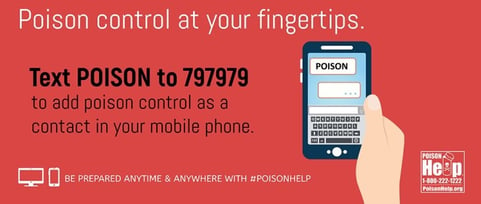Poisoning is the #1 cause of injury death in the United States, and the number of children who die from poisoning has more than doubled since 1999. According to the American Association of Poison Control Centers’ National Poison Data System’s 2015 Annual Report, just under half of exposure cases managed by poison centers involved children younger than six.
The truth is that anything, even water, can be poisonous when used in the wrong way, in the wrong amount, or by the wrong person. The main goal of poisoning prevention isn’t to get everything that could be toxic out of your house if you have kids; that would be impossible and inconvenient.
However, there are some simple precautions that parents and caregivers can take to help keep children safe:
-
Be Prepared for an Emergency.
Put the Poison Help phone number (1-800-222-1222) in your mobile phone, and display it in your home and at work in case of emergency. You can easily add the Poison Help number to your contacts by texting the word “poison” to 797979 and adding poison control as a contact in your smartphone.

-
Practice Safe Storage Habits.
Ideally, the following things should be stored up, away, and out of sight of children. Alternatively, keep these substances in locked cabinets or containers. Keep in mind that there is no such thing as a 100% child-proof lock or container, and there is no substitution for adult supervision and vigilance. This includes:
- All medications and pharmaceuticals, including over-the-counter medicines, vitamins, and supplements
- Tobacco and e-cigarette products, especially liquid nicotine
- Laundry and cleaning supplies
- Pesticides and insect repellants
- Button batteries
- Any type of oil or lubricant, including fragrance oils, tiki torch oils, engine oil, etc.
- Personal care products, especially contact lens disinfectants and hand sanitizers
- Other chemicals
-
Read and Follow Labels and Directions.
Make a habit of reviewing the label on any potentially hazardous substance or product prior to use, especially before administering medications to children. Follow not only usage directions but the directions provided for safe storage and disposal as well. Call your poison center at 1-800-222-1222 if you have any questions about the directions.
-
Detect Invisible Threats.
Install carbon monoxide detectors in your home. For more information on carbon monoxide, visit the Consumer Products Safety Commission’s Carbon Monoxide Information Center.
On September 26, 1961, in order to encourage Americans to learn more about the dangers of accidental poisonings and to take appropriate preventative measures, Congress passed a joint resolution (Public Law 87-319) requesting that the President of the United States proclaim the third week of March National Poison Prevention Week. During the 2017 National Poison Prevention Week, the following daily themes will be promoted, and we encourage you to participate by sharing content from the downloadable toolkit:
- Monday, March 20 – Children Act Fast … So Do Poisons
- Tuesday, March 21 – Poison Centers: Saving You Time and Money
- Wednesday, March 22 – Poisonings Span a Lifetime
- Thursday, March 23 – Home Safe Home
- Friday, March 24 – Medicine Safety
In addition, we encourage you to take the pledge to prevent poisoning by texting the word “poison” to 797979, adding poison control as a contact in your smartphone, and sharing the contact with three friends. You can also take the pledge online.
For additional information on National Poison Prevention Week, along with poison prevention tips and resources, visit AAPCC’s National Poison Prevention Week webpage at http://www.aapcc.org/prevention/nppw/.
Follow NPPW on social media using #NPPW17 and #PreventPoison and help spread the word.
Brittany Hansen is the Associate Manager of Public Education at the American Association of Poison Control Centers.






